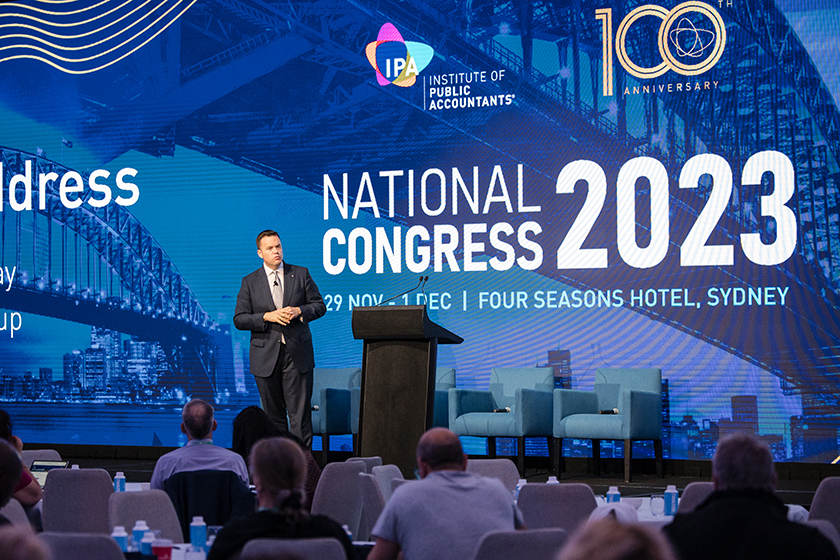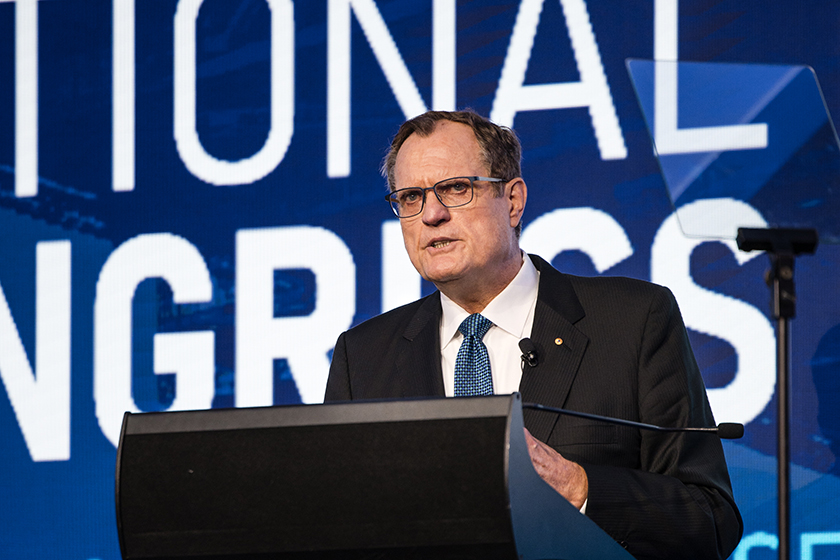ATO governance needs reform: IPA-Deakin SME Research Centre
The IPA-Deakin SME Research Centre has examined the shortcomings of the ATO’s governance model and proposed a Tax...
READ MORE
A live stream audience of hundreds joined the capacity in-person attendees for day two of the IPA National Congress. Alongside practical sessions focused on technical and professional aspects of accounting, speakers discussed the causes of and fall-out from the PwC scandal, recovering trust, the future of accounting, the opportunities in sustainability, tax administration and more. Here are five highlights.

(l-r) Rachel Grimes AM, Director, APESB; Andrew Mills, Chair, Financial Reporting Council; Peter de Cure AM, Chair, Tax Practitioners' Board; Vicki Stylianou, Group Executive Advocacy and Policy, IPA
Panel:
Before the panel discussion began, IPA Group CEO Andrew Conway had already addressed the scale of the problem facing the whole profession – though not caused by the whole profession.
“We may not have created the problem, but we must own the solution,” Conway said, pointing out that doing so would require leadership and bold vision.
Introducing the panel, Stylianou emphasised the importance of a solution to regain eroded trust.
“It doesn't matter if you're a patient, a plaintiff or a client, because the foundation of every profession is trust. And the foundation of every one of those relationships is trust,” Stylianou said.
When Stylianou asked Senator O’Neill about the chances of regaining trust, O’Neill argued that we need to take a step back in terms of priorities.
“I think that we need to consider that we're really not in a post-PWC world,” O’Neill said.
“We're right in the middle of it.”
O’Neill argued that there is a lot of work left to do to correct the culture within PwC.
“The practice has been described to us as the pursuit of pure profit without an understanding of the social licence and such responsibilities of operating a profitable business in an effective and functioning democracy that takes social responsibilities seriously.”
Asked whether he would act differently with the benefit of hindsight, to maintain the trust of the government, the tax profession and the public, de Cure reflected on the lessons that could be learnt from this experience, particularly in terms of information sharing and disciplinary processes.
“I really don't like to use hindsight for that sort of re-hashing of a particular issue,” de Cure said.
“But what I would like to say is that through the conduct of this issue through the James review of the TPB that happened in the year prior to this coming to the surface, I think we've identified that there were some material shortcomings in our regulatory environment, in particular in relation to issues like capacity and ability to legally share information with fellow regulators, with government and with professional bodies.
“I think this issue has brought to the surface some degree of inadequacy in the range of sanctions that are available to the TPB to sanction and discipline registered practitioners.”
Mills also addressed the topic of information sharing: “There are great limitations on the way in which an agency that receives information from the citizen is required to keep that safe and secure, and that's really appropriate. But I also have a citizen viewpoint, who gets so frustrated that they have to tell the same information over and over again to different bodies,” he said.
He also pointed out the lack of information sharing and cooperation between agencies can mean that disciplinary processes and investigations are drawn out – with professional bodies waiting for the regulators to complete their process before being able to commence their own investigations.
“That's not a great experience for the people who are involved, who have to go through the same process twice. There could be better coordination.”
For Grimes, a concern at least equal to those who are not compliant with the regulatory bodies is the ‘regulatory gap’ – those in the profession who are not members of a professional body, not bound by a code of ethics, and not bound by regulatory standards.
“The first thing I'd say is that the very definition of a profession is an ethics code,” Grimes said.
“But I think if you look at the code of ethics in itself, and what's happened in this situation, nobody has said that there was a deficiency in the ethics code. But there's a deficiency in the compliance with the code.”
As well as compliance, Grimes pointed out a blind spot that has grown as the practice of accounting has broadened.
“Recently, I did a full review of a company that I was involved in, on sustainability. And we brought in one of the big four, and I just asked everyone their background. One was a marine biologist, one was a technologist, one was a data analyst, and so on. And so I said to the partner, ‘Who's in charge here? What code of ethics does every one of those people comply with?’.
“And they said, ‘Well, they've got to meet our requirements’.
If you look at the big four, 75% of their revenue came from non-assurance work. And if we add sustainability into that mix, that's going to get bigger. So how do we ensure all those people are captured by this?
“This is where the IESB is looking to share their standards more broadly. And I think if we're going to get a better result, government and big business should be [asking that] everybody in their procurement section signs up to some form of standards.”

IPA Group CEO Andrew Conway
IPA Group CEO Andrew Conway identified major issues shaping the future of the accounting profession.
“What the fifth industrial revolution tells us is that it's really about putting people at the centre of everything that we do,” Conway said.
“Now I spoke this morning about this human-centred approach. But what the fifth industrial revolution is saying is it's actually about the interconnectedness, the intersection between people, issues of the environment and action.
“In our context, in essence, the who, the what and the how of sustainability.
“If we talk about 1923 being the birth of the modern era, I would suggest that 2023 is very much this hinge point in trust, in digitisation, sustainability. It is now being talked about as the fifth industrial revolution.”
“The World Economic Forum has done a number of studies – a longitudinal analysis of what students sentiment and young people sentiment is in their career,” Conway said.
“The first thing they want is to know that their work has social impact. That's what they want.”
“This notion of just making money, it's actually not the primary motivation. It is to know that there will be social impact – now that might be generational and might be a whole range of factors but we have to acknowledge that's what it is.”
“And we can easily criticise it, but really we’ve got to acknowledge the fact that students want that social impact. And so what does this actually mean in practice? It means we have to be community focused. We have to make sure that we encourage them to look to the future, and do that ourselves.”
“And to acknowledge that we don't necessarily always talk in social impact language, or talk about Sustainable Development Goals in our practices or businesses. But that is the language they speak. So we have to retrain our approach to managing younger people.”
“If you want to attract and retain younger people, we have to learn and retrain as well.”
And, while higher education and pathways into the profession do have a way to go to produce the calibre and number of graduates the profession requires, Conway also suggested a reality check for those expecting new graduates to be ready for client-facing work immediately.
“I don't know about you, but when I started in practice [...] I wasn't sent out to a client on day two.”
Conway referred to sustainability reporting as one of the most significant opportunities for the accounting profession.
“If I were starting a practice today, I would be starting a sustainability assurance practice, hands down. It is going to transform the way the professional operates,” Conway said.
“Someone will take this space if we don't seize it as a profession, it’s as simple as that.”
The stars have aligned and are making this unstoppable, Conway told the audience, with government, private sector, community, the profession, educators and students all pulling in the same direction.
“We're not at the stage of it being autonomous yet. That is, the ability of an algorithm to completely replicate a human being. But the scientists say it won't be too far away,” Conway said.
“The data and the algorithm is used to support the human function, which means we're having a human interface. We script it, we design it, we build the model, we load the data.
“Think about natural language processing of chatbots. Okay, so we've got opportunities here to scope out the spaces of AI.”
“Who, in the next 12 months, thinks that they will have to deal with some facet of aged care for either themselves or their clients?” asked Bronny Speed, Director and Founder of AccountantsIQ. The majority of audience members raised a hand.
Speed was onstage demonstrating her new offering for accounting professionals, AgedCareIQ. Accountants can use it to help their clients navigate the aged care system, understand how it works, and save time and emotional labour.
Hot tip live from the stage: if you, like Speed, buzz around the Peter’s of Kensington website like a pro, you’ll find the AgedCareIQ platform a snap.

Commissioner of Taxation Chris Jordan AO
“We know many people, including small businesses, are struggling. But the ATO has a job to do,” Commissioner of Taxation Chris Jordan AO said, flagging his agency’s current focus on pursuing debt.
“This includes non or late payment across all business segments, including small businesses. I am unapologetic about this. The ATO is not a bank offering cheap loans and a cashflow buffer. Paying tax isn’t optional.”
Jordan sold debt collection to attendees: “protecting other creditors” and “to level the playing field and protect workers”.
“We’ve recently issued over 31,000 Director Penalty Notices and reported 10,500 businesses to credit bureaus for debts over $100,000,” he said.
Jordan noted that the ATO “has historically instigated only one in six corporate insolvencies”.
“The remainder are instigated by other creditors and the majority by the businesses themselves.”
With business insolvency back to the highs of the mid-2010s, and more than three-quarters of insolvent companies carrying liabilities for unpaid taxes, the RBA’s latest Financial Stability Review partly attributes the insolvency uptick to the ATO’s post-pandemic enforcement activities.
“This is likely to continue to prompt some businesses that are unable to pay their debts to commence formal insolvency procedures,” the RBA review noted.
While Jordan had briefly made a case for client-to-agent linking in his address, a question on the topic that had been submitted by an audience member drew a rumble of agreement in the room.
“I would be remiss if I didn't raise this particular issue,” Tony Greco said as he asked the client-to-agent linking question on behalf of the audience member. “We understand why [this is necessary] – the why is undisputed. It's just too easy for someone to add a client and we've got bad actors [...] I think it's the technology that's been used.”
Greco noted the clunkiness of the nomination process, particularly for agents with less sophisticated clients, and shared that the accounting bodies are getting clear and consistent negative feedback on this topic.
“I think what you're basically saying is we've just got to put up with the technology solution that’s been offered, but one would hope it could work out a better way,” Greco said.
Jordan reiterated the ‘why’ – the security and fraud concerns that make a solution necessary, and committed to taking the feedback on the particular solution back to the agency.
“I absolutely acknowledge that you told me that the technology solution is not good,” he said. “We did consult on it. I don't know why it is so clunky, I'm just not close enough to it. But I accept you saying that, and I've heard that elsewhere.”